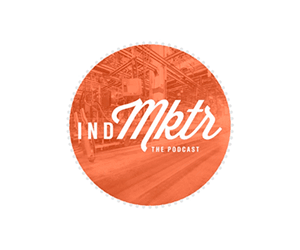Successfully navigating the complex B2B buying process depends on a solid industrial marketing strategy, which can be created using a flexible core process that answers some fundamental questions.
In the latest episode of the Industrial Marketer podcast, co-hosts Joey and Nels discuss how a successful industrial marketing strategy begins at the intersection of your company’s goals and objectives with your messaging. What do you want to accomplish with your marketing in terms of reach, leads or sales? And how does your messaging answer the questions that keep your customers awake at night? Deciding on and documenting what you want to convey about your products and services — and how they provide solutions to customers and prospects — will provide your industrial marketing strategy with a crucial foundation.
The Elements of a Solid Industrial Marketing Strategy
A successful industrial marketing strategy will follow a roadmap that allows all sorts of flexibility and creativity. The formula includes:
- Goals and Objectives – This is simply summarizing what the company wants to accomplish in order to align the marketing tactics. What are the measurable steps we must achieve to accomplish our goal?
- Approach – Whatever you marketing does depends on whether you are introducing a product or service or emphasizing a certain value such as a maintenance relationship or a range of solutions.
- Ideas – This is the creative aspect of your messaging.
- Distribution – Who are you targeting and how/when and where will you reach them?
- Measurements – Your ROI and developing actionable insights from the strategy will depend on having good tracking data. Also consider whether you are doing A/B testing, which can be as simple as different versions of email subject lines.
Industrial Marketing Channels and How They Apply
The possibilities for tactics and channels are vast, but it is essential to connect the dots from those tactics to your business goals. Different forms of digital media play well together, so keep in mind the importance of optimizing your existing assets, especially if they relate to your industrial marketing strategy. For example, if you expect to have more eyeballs on certain sales brochures or product manuals, make sure they are up to date and accessible and consider including testimonials and success stories.
Here are a few examples of how messaging gets implemented:
- Content marketing – This could be a blog post or video about a solution you offer that prospects find in the research phase through search, a sponsored newsletter or some other link you distribute via social media or email.
- Paid media and landing page – Targeted paid media nicely complements content marketing. Be sure to link it with a specific landing page on your website to collect prospect information and help qualify leads.
- Email automation and nurturing – Once a visitor has engaged with your content or site, you must have a process for scoring and pursuing that lead.
How Do You Measure the Success of Your Industrial Marketing Strategy?
Just as there are a vast array of tactics, there are many metrics to consider for measuring the success of your industrial marketing strategy. Again, keep the goals in mind. You want the measurements to be relevant and able to lead to actionable insights. For example, page views or social media likes may have little to no impact on creating qualified leads and would therefore be irrelevant to an industrial marketing strategy geared toward lead generation.
Here’s what to keep in mind for measuring the success of your strategy:
- Establish appropriate KPIs (key performance indicators) – Number of RFQs filled out might be more appropriate for an industrial marketing strategy than website visits. But don’t overlook basics like what keywords people use to find your website.
- Employ tracking tools – Website tracking, such as Google Analytics, is table stakes. The world of tracking pixels and cookies is complex and fast-changing, so you may need outside help.
A roadmap alone is not enough to guarantee a successful industrial marketing strategy. But having a reliable framework does put you in a better position to leverage best practices and achieve your goals.
Listen to the Podcast for More on How to Create a Successful Marketing Strategy
For more insights into what makes for a successful industrial marketing strategy, tune into Episode 18 of the Industrial Marketer podcast.
Subscribe to the Industrial Marketer Podcast
The Industrial Marketer podcast comes out twice a month. To subscribe, visit our Buzzsprout show page and select your podcast platform of choice.
And if you have any ideas for topics you’d like us to cover on the podcast — or here on the Industrial Marketer website — send us a message on Facebook or Twitter and let us know!




